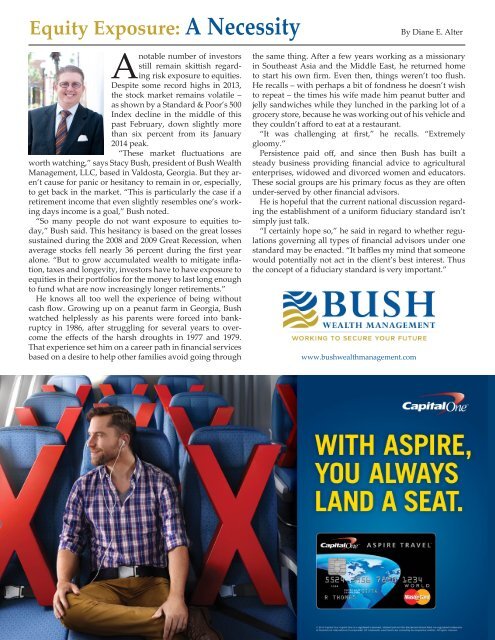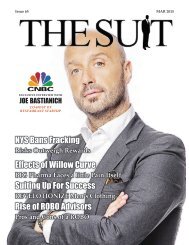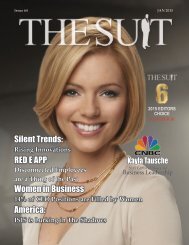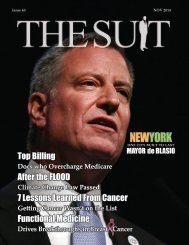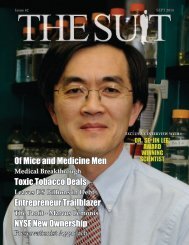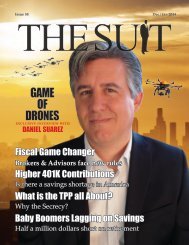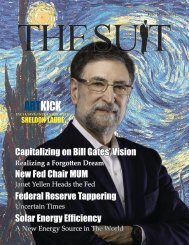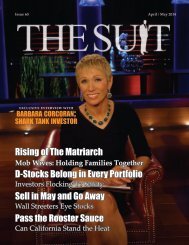o_19grqq7snim9mn019q11f7ds26a.pdf
Marcus Lemonis, a serial entrepreneur and host of the show “The Profit” on CNBC, is a true survivor in the corporate world. The native-born Lebanese business man endured the chaos of a civil war in Beirut and eventually moved to Miami. Lemonis was exposed to the automotive industry throughout his upbringing - his grandfather owning two of the largest Chevrolet dealerships in the United States and Lee Iacocca serving as the family friend and later mentor to Lemonis. On page 12, we conducted an interview with “Profit” host Marcus Lemonis, who offers struggling small businesses capital investment and his expertise in exchange for an ownership stake in the company. In the latter part of the magazine, we interviewed countless wealth advisors during these tough economic times. We recognize that some of the changes in 2013 and 2014 require relevance for financial planners. Therefore, the financial industry continues to push for more realistic standards and reforms.
Marcus Lemonis, a serial entrepreneur and host of the show “The Profit” on CNBC, is a true survivor in the corporate world. The native-born Lebanese business man endured the chaos of a civil war in Beirut and eventually moved to Miami. Lemonis was exposed to the automotive industry throughout his upbringing - his grandfather owning two of the largest Chevrolet dealerships in the United States and Lee Iacocca serving as the family friend and later mentor to Lemonis. On page 12, we conducted an interview with “Profit” host Marcus Lemonis, who offers struggling small businesses capital investment and his expertise in exchange for an ownership stake in the company. In the latter part of the magazine, we interviewed countless wealth advisors during these tough economic times. We recognize that some of the changes in 2013 and 2014 require relevance for financial planners. Therefore, the financial industry continues to push for more realistic standards and reforms.
You also want an ePaper? Increase the reach of your titles
YUMPU automatically turns print PDFs into web optimized ePapers that Google loves.
Equity Exposure: A Necessity<br />
By Diane E. Alter<br />
A<br />
notable number of investors<br />
still remain skittish regarding<br />
risk exposure to equities.<br />
Despite some record highs in 2013,<br />
the stock market remains volatile –<br />
as shown by a Standard & Poor’s 500<br />
Index decline in the middle of this<br />
past February, down slightly more<br />
than six percent from its January<br />
2014 peak.<br />
“These market fluctuations are<br />
worth watching,” says Stacy Bush, president of Bush Wealth<br />
Management, LLC, based in Valdosta, Georgia. But they aren’t<br />
cause for panic or hesitancy to remain in or, especially,<br />
to get back in the market. “This is particularly the case if a<br />
retirement income that even slightly resembles one’s working<br />
days income is a goal,” Bush noted.<br />
“So many people do not want exposure to equities today,”<br />
Bush said. This hesitancy is based on the great losses<br />
sustained during the 2008 and 2009 Great Recession, when<br />
average stocks fell nearly 36 percent during the first year<br />
alone. “But to grow accumulated wealth to mitigate inflation,<br />
taxes and longevity, investors have to have exposure to<br />
equities in their portfolios for the money to last long enough<br />
to fund what are now increasingly longer retirements.”<br />
He knows all too well the experience of being without<br />
cash flow. Growing up on a peanut farm in Georgia, Bush<br />
watched helplessly as his parents were forced into bankruptcy<br />
in 1986, after struggling for several years to overcome<br />
the effects of the harsh droughts in 1977 and 1979.<br />
That experience set him on a career path in financial services<br />
based on a desire to help other families avoid going through<br />
the same thing. After a few years working as a missionary<br />
in Southeast Asia and the Middle East, he returned home<br />
to start his own firm. Even then, things weren’t too flush.<br />
He recalls – with perhaps a bit of fondness he doesn’t wish<br />
to repeat – the times his wife made him peanut butter and<br />
jelly sandwiches while they lunched in the parking lot of a<br />
grocery store, because he was working out of his vehicle and<br />
they couldn’t afford to eat at a restaurant.<br />
“It was challenging at first,” he recalls. “Extremely<br />
gloomy.”<br />
Persistence paid off, and since then Bush has built a<br />
steady business providing financial advice to agricultural<br />
enterprises, widowed and divorced women and educators.<br />
These social groups are his primary focus as they are often<br />
under-served by other financial advisors.<br />
He is hopeful that the current national discussion regarding<br />
the establishment of a uniform fiduciary standard isn’t<br />
simply just talk.<br />
“I certainly hope so,” he said in regard to whether regulations<br />
governing all types of financial advisors under one<br />
standard may be enacted. “It baffles my mind that someone<br />
would potentially not act in the client’s best interest. Thus<br />
the concept of a fiduciary standard is very important.”<br />
www.bushwealthmanagement.com


